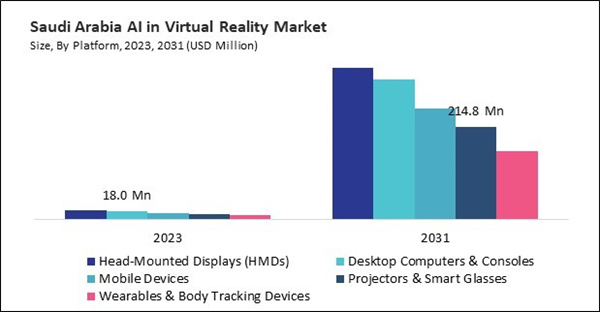The Brazil market dominated the LAMEA AI in Virtual Reality Market by Country in 2023, and is expected to continue to be a dominant market till 2031; thereby, achieving a market value of $4.37 billion by 2031. The Argentina market is showcasing a CAGR of 45.5% during 2024-2031. Additionally, the UAE market would register a CAGR of 44% during 2024-2031.
AI-driven virtual assistants, integrated into VR shopping experiences, offer a personalized concierge service for online shoppers. These smart assistants can guide customers through a virtual store, help them find products, compare prices, and suggest complementary items.
Moreover, by using machine learning, these assistants can learn each customer's preferences and buying behavior, becoming more effective over time. In virtual stores, AI assistants can interact with customers in real-time, answering queries and offering tailored recommendations, just as a personal shopper might in a physical store.
The substantial financial investments made by the Saudi government in healthcare IT and digital transformation play a pivotal role in advancing AI in VR. The Kingdom’s focus on transforming its healthcare system into a more digitized and AI-driven ecosystem has led to various projects to improve patient care, increase operational efficiency, and enhance the overall healthcare experience. These investments are fueling the adoption of AI technologies within virtual reality applications, particularly in training, patient care, and remote healthcare services.
Based on Technology, the market is segmented into Computer Vision, Machine Learning & Deep Learning, Natural Language Processing (NLP), and Gesture, Speech Recognition & Others. Based on Platform, the market is segmented into Head-Mounted Displays (HMDs), Desktop Computers & Consoles, Mobile Devices, Projectors & Smart Glasses, and Wearables & Body Tracking Devices.
List of Key Companies Profiled
- Microsoft Corporation
- HTC Corporation
- Meta Platforms, Inc.
- Samsung Electronics Co., Ltd. (Samsung Group)
- Sony Corporation
- Unity Software Inc.
- Magic Leap, Inc.
- Apple, Inc.
- Qualcomm Incorporated (Qualcomm Technologies, Inc.)
- Google LLC
Market Report Segmentation
By Technology
- Computer Vision
- Machine Learning & Deep Learning
- Natural Language Processing (NLP)
- Gesture, Speech Recognition & Others
By Platform
- Head-Mounted Displays (HMDs)
- Desktop Computers & Consoles
- Mobile Devices
- Projectors & Smart Glasses
- Wearables & Body Tracking Devices
By Application
- Gaming & Entertainment
- Education & Training
- Healthcare & Medical
- Retail & E-commerce
- Social Media & Communication
- Industrial & Manufacturing
- Tourism & Travel
- Others
By Country
- Brazil
- Argentina
- UAE
- Saudi Arabia
- South Africa
- Nigeria
- Rest of LAMEA
Table of Contents
Companies Mentioned
- Microsoft Corporation
- HTC Corporation
- Meta Platforms, Inc.
- Samsung Electronics Co., Ltd. (Samsung Group)
- Sony Corporation
- Unity Software Inc.
- Magic Leap, Inc.
- Apple, Inc.
- Qualcomm Incorporated (Qualcomm Technologies, Inc.)
- Google LLC









